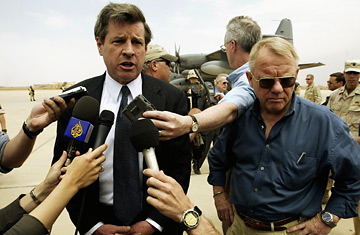
Ambassador Paul Bremer and General Jay Garner from No End in Sight, directed by Charles Ferguson.
Basically, it is just a talking-heads documentary, interleaved with some routinely dismaying shots of deadly carnage in a far-away place. Moreover, what those heads are talking about is a failed political policy — not, on the face of it, the most riveting of cinematic subjects.
That said, prepare to be riveted: No End in Sight, Charles Ferguson's first film, is without question the most important movie you are likely to see this year. It is not a film that simply massages your pre-existing attitudes about the war in Iraq. Rather it is a work that tells you things you almost certainly did not know about that disaster or things that have been lost to sight as chaos, anarchy and our feelings of helplessness have grown over the years since the invasion of 2003. Specifically, what it says is that the war was lost by the "coalition" in its first month — when U.S. forces failed to protect the Iraqi museum and library, among 20 other invaluable cultural, social and political sites.
"Now we have no national heritage," a curator, standing in the ruins of his institution, says. This is bad enough, but the failure had dire and immediate political consequences as well. Televised images of the looters sent a message to the Iraqis that absent the imposition of martial law (which the U.S. had a right to declare under the Geneva Conventions) ordinary citizens had nowhere to turn for protection of their lives and property. Except to the Muslim militias. Here was a faith-based initiative with a new and deadly face. Meanwhile, back in Washington, Donald ("I don't do quagmires") Rumsfeld made his little jokes: who knew there were so many vases available for purloining in Iraq?
In Baghdad, our ambassador, Barbara Bodine, discovered that there were no chairs, desks or typewriters for ORHA (the Office for Reconstruction and Humanitarian Assistance) to work from and that her Arabic-speaking staffers were five in number. It is observed that the U.S. began planning for the occupation of Germany after World War II began two years before the fact. ORHA's planning time was less than 90 days. And its leader, retired army general Jay Garner, was essentially shut out of that process. He and ORHA were then shut out of Iraq less than a month after his arrival, replaced by Ambassador L. Paul Bremer and CPA (the Coalition Provisional Authority), which almost immediately made two huge and irreversible mistakes: the de-Ba'athification of the country's government (which meant that most of bureaucrats who knew how to manage the country were dispensed with) and the disbanding of the 500,000-man Iraqi army, which might have helped restore order, but which now became a vast pool of the angrily unemployed.
You think this sounds like pretty dry stuff? You're wrong. There were people in Washington and Baghdad who invested their lives in the effort to do this job right. They ranged in rank from Deputy Secretary of State Richard Armitage to an earnest Marine lieutenant named Seth Moulton, and in their interviews with Ferguson, you can sense their still-seething contempt for their ideologue leaders and their refusal to come to grips with the practical realities of turning chaos into governance.
Understandably, not many of the Big neo-con thinkers chose to sit for Feguson's cameras, but one of them, a slippery, sneering and supercilious man named Walter Slocombe, a senior advisor to CPA, did. He was a reluctant warrior, whose visits to Iraq were few and brief. But he says he was in constant contact with Col. Paul Hughes, who was struggling to keep the Iraqi army intact. Hughes is a polite, low-keyed sort of guy, but when asked about his contacts with Slocombe he finally cracks. Mostly what they discussed, he says, was what kind of car he would have in Baghdad and who his cook would be.
No End in Sight does not directly answer the central question raised by the Iraq disaster: How did an obviously difficult undertaking so quickly deteriorate into an impossible one? But maybe it doesn't have to. In general, ideology makes imbeciles of everyone caught in its grip. Safe in their offices far, far away, the True Believers think they can summon spirits from the vasty deep, as Shakespeare put it, but that does not mean they will come — especially if the water and electricity (and the police force) fail to function. Or, to borrow a little less grandly from the Bard, "For want of a nail..."
It can be argued that this film is largely addressing mistakes and grievances that are now beyond redress. But that's not strictly true. The kinds of errors it examines are entirely duplicable. And it is important to have this grand compilation of serious, sometimes anguished, testimony to remind us that big talk is always cheap and essentially dreamy. Who knew that a bunch of medium shots of well-spoken, nicely dressed men and women could transcend mere journalism and bring us very close to the authentic tragedy lurking behind the Green Zone's concrete walls.
